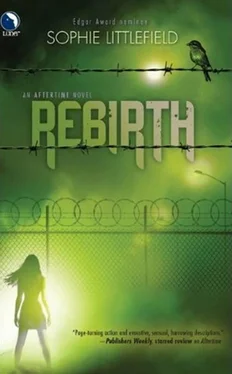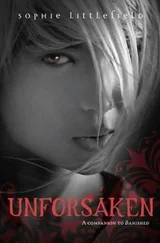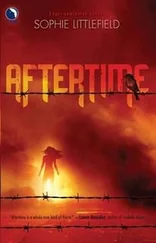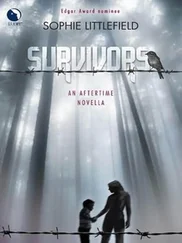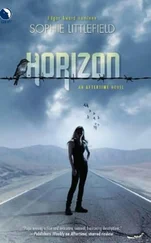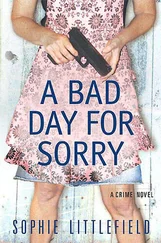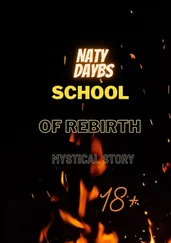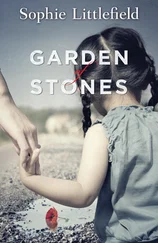“That’s right,” Dor said, and he didn’t give her anything more, he refused to acknowledge how hard it was to say the words. And that was as it had to be. It didn’t matter that it was hard. Cass repeated that to herself as they covered the last of the distance to the wall: it doesn’t matter. It doesn’t matter .
Up close the men waiting for them were nothing like Faye and Charles and Three-High…nothing like Smoke. They wore various unmatched shades and patterns of khaki and camo, and their hair was cropped short and they wore sunglasses that made their expressions unreadable.
“Put the little boy down,” the first soldier said, cradling his rifle with assurance. His partner took a single step forward. He wore a cap embroidered with the initials FDNY, a retro item that had become popular since the twentieth anniversary of the Manhattan tragedy. “Take off your packs and drop them on the ground. Then hold your open hands out to your sides, thumbs down.”
Of course they thought Ruthie was a boy, with her clothes and her short haircut, but somehow the mistake disrupted Cass’s fragile composure and she froze. When she saw that the soldiers were growing impatient, she snapped to and let her pack slip from her shoulders to the ground.
Dor set Ruthie down gently next to her, and Cass reached for her hand automatically. Ruthie pressed her face against Cass’s leg, wrapping her arms around her knee. She was frightened, and Cass wanted to sweep her up and hold her close. But she could not, and she held her breath and squeezed her daughter’s hand more tightly.
“I’ll search the child first.” The second soldier knelt down in front of Ruthie and held out his hands. “Hey, buddy.”
Ruthie clung more tightly to Cass. “She’s a girl,” Cass said. “She’s scared. Isn’t there any way you could-”
“Only take a minute.” The guard pried Ruthie away from her and Cass waited for flailing, maybe even screaming, but Ruthie went limp and allowed herself to be led. Which was almost more upsetting to Cass, who wondered for the thousandth time what had happened in the Convent to make Ruthie so compliant, to drain her fighting spirit.
“Hello, princess, what’s your name,” the guard asked in a bored voice as he unzipped Ruthie’s jacket and patted her down. He didn’t seem to care that Ruthie didn’t answer. He pulled her boots off one at a time and checked them, shaking them upside down, then patted Ruthie’s feet through her socks before finally nodding at Cass. “You can get her back in her clothes.”
Cass dressed her with trembling fingers, whispering that it would be okay and hating that she’d betrayed her daughter yet again, forced her to submit to a stranger, maybe to relive some unknown horror. How many times would she drag her daughter into fresh, unknown dangers?
As often as it took. The words echoed in her mind and Cass bit her lip just enough to taste the blood, sealing her own deal with herself. As often as it took, and now that the Box was growing more unstable every day, her job was to find somewhere new, for Ruthie and for herself, and that wouldn’t be easy, or safe. Dor was their ticket. This place was their next hope. That was just how it had to be.
Their own pat-downs were brisk and professional and Cass barely registered the soldier’s hands on her. Their weapons went into a plastic box, which one of the soldiers loaded onto a small cart, along with their packs, before wheeling it into the interior of the compound and out of sight. He came back a few moments later with a short young woman in a close-fitting ski-jacket and shearling boots.
“This is Nell,” the soldier said, already turning back to his post. “She’ll conduct your intake interview.”
Cass swept Ruthie up in her arms and followed the woman, Dor close behind. Nell gave them a distracted smile and walked briskly down the wide walkway that led straight into the heart of the campus. Other than the fact that few people were outside the classroom buildings and dorms, it looked remarkably like it had Before.
Cass had been to Colima one time that she hadn’t told Dor about-hadn’t told Smoke or anyone. It was when she had begun her hopeful, short-lived savings account, when she thought she might really attend college. She’d come down, taken the tour, picked up the applications, but by the end of the day the voices in her head-cowed by the stacks of paperwork, the trim navy suits and polished heels worn by the administrative staff, the laughing knots of students who raced between classes-joined in a chorus of derision, reminding her she was too old, too stupid, too damaged to ever come here, and she’d gone to a bar on her way out of town instead.
The news had been full of images of the campus after the first strike. Students swarmed the green to protest the dean’s decision to cut the semester short and send them home. They jeered as he solemnly announced the unanimous decision of the trustees that adequate security could not be promised. It hadn’t been the first time UC-Colima had been in the news in recent years. Well before the bioterror attacks, students organized regular protests of the genetic engineering research that was rumored to be going on there. There had been footage of students ringing the biotech building holding hands and chanting-there, that one, that squat flat-roofed building with the curved entrance. They ran footage of minor scuffles, bricks thrown through windows, campus administrators hung in effigy. And again, later, while students were being escorted from their dorms by the National Guard, hadn’t protesters set fire to a couple of buildings? There, possibly-a stubbled field across the green, empty except for tall piles of bricks, some of them singed black at the edges-could they have carted off the rest of the rubble? Or were they using the remains of the building to build the section of the wall out front?
Cass squinted against the setting sun. The wall-in-progress extended past her line of vision, around behind the campus buildings. A man wearing coveralls stood at a window nearby doing something painstaking. Puttying perhaps, or fixing hardware.
Elsewhere, a crew worked at a copse of dead sycamores, sawing off branches high in the trees, throwing them on a growing pile. Cass thought of the little crape myrtle seedling she’d been nurturing back in the Box. It was too early to know yet what color the blossoms would be-it would take at least another growing season before it bloomed-but it had the stout countenance and silvery bark of a lavender Muskogee, rare among the pink-flowering varieties. A row of them-they grew to a tidy twenty feet, rarely taller-would fit beautifully in the rectangular bed where the men were working, shading the tall windows of the classroom building and the pair of limestone benches.
Stop, she thought. She was not here to create a garden.
Halfway up the side of what she assumed was a dormitory, perhaps six or eight floors off the ground, clothesline was strung from one window to the next. A few shirts and pillowcases fluttered in the wind, and Cass thought she could make out the silhouettes of people in some of the windows.
Nell led them through the campus, skirting the deserted green, thick with dormant kaysev and, here and there, dandelions and weedy peppergrass. Cass spotted a couple of mugwort, which, if they were left alone, would grow a few feet tall and attract bees. She wondered if anyone here knew what they were doing, and scanning the flower beds, she imagined them planted with ornamental olives and weeping cherry and baby’s tears between the paving stones.
She could make something of this place. The hardscape had been well-planned, the earth amended and fertilized. Things would grow here, beautiful things, and Cass could do the work she had always imagined, planning and creating gardens that would sustain people. So she would live among those whose beliefs about Aftertime were different from her own…would that be so bad? Would that be so different from living alongside some of the Box’s residents?
Читать дальше
Конец ознакомительного отрывка
Купить книгу
